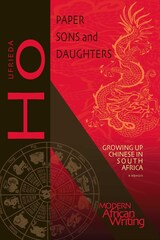2 books about Growing up Chinese

Legacies of Childhood
Growing up Chinese in a Time of Crisis
John L. Saari
Harvard University Press, 1990
Jon L. Saari defines the generation of educated Chinese born around the turn of the century as "the last to have the world of Confucian learning etched into their memories as schoolboys, yet the first as a group to confront the intrusive Western world." The legacies of growing up in a changing environment deeply affected this generation's responses to the further changes in the world they confronted as adults. In the collapse of the Ch'ing dynasty and the chaos of the early twentieth century, traditional ideas of the self, the nature of relationships in society, and ethical behavior had to be reexamined and redefined. To reconstruct what those who lived through and shaped this extraordinary period felt, needed, thought, and became as children and adults, Saari draws on autobiographical writings and his own interviews among the elderly on Taiwan and Hong Kong. He interprets this material within its Chinese context but brings Western sociological, anthropological, and psychological insights to bear on it.
[more]

Paper Sons and Daughters
Growing up Chinese in South Africa
Ufrieda Ho
Ohio University Press, 2011
Ufrieda Ho’s compelling memoir describes with intimate detail what it was like to come of age in the marginalized Chinese community of Johannesburg during the apartheid era of the 1970s and 1980s. The Chinese were mostly ignored, as Ho describes it, relegated to certain neighborhoods and certain jobs, living in a kind of gray zone between the blacks and the whites. As long as they adhered to these rules, they were left alone. Ho describes the separate journeys her parents took before they knew one another, each leaving China and Hong Kong around the early 1960s, arriving in South Africa as illegal immigrants. Her father eventually became a so-called “fahfee man,” running a small-time numbers game in the black townships, one of the few opportunities available to him at that time. In loving detail, Ho describes her father’s work habits: the often mysterious selection of numbers at the kitchen table, the carefully-kept account ledgers, and especially the daily drives into the townships, where he conducted business on street corners from the seat of his car. Sometimes Ufrieda accompanied him on these township visits, offering her an illuminating perspective into a stratified society. Poignantly, it was on such a visit that her father—who is very much a central figure in Ho’s memoir—met with a tragic end. In many ways, life for the Chinese in South Africa was self-contained. Working hard, minding the rules, and avoiding confrontations, they were able to follow traditional Chinese ways. But for Ufrieda, who was born in South Africa, influences from the surrounding culture crept into her life, as did a political awakening. Paper Sons and Daughters is a wonderfully told family history that will resonate with anyone having an interest in the experiences of Chinese immigrants, or perhaps any immigrants, the world over.
[more]
READERS
Browse our collection.
PUBLISHERS
See BiblioVault's publisher services.
STUDENT SERVICES
Files for college accessibility offices.
UChicago Accessibility Resources
home | accessibility | search | about | contact us
BiblioVault ® 2001 - 2024
The University of Chicago Press









